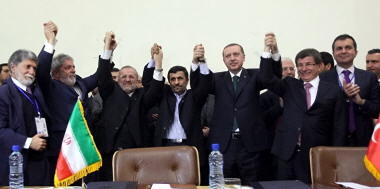Iran, Turkey and Brazil have signed a joint declaration that would see Iran swap 1200 kg of its own low-enriched uranium for fuel for a research reactor.
 |
| Presidents Ahmedinejad (Iran) and Lula (Brazil) and prime minister Erdogan (Turkey) join in the celebrations of the joint declaration |
Under the terms of the joint declaration, signed in Tehran in front of the three countries' heads of state, Iran agrees to deposit 1200 kg of its own low-enriched uranium in Turkey for safekeeping. While in Turkey, the uranium would remain Iranian property but would be open to monitoring by observers from the International Atomic Energy Agency (IAEA) and Iran. In return, Iran would receive 120 kg of the fuel it needs for the Tehran Research Reactor (TRR) supplied by the so-called Vienna Group, comprising the US, Russia, France and the IAEA.
The TRR, which produces medical isotopes, requires fuel enriched to 19.75% uranium-235 which has in the past been supplied from foreign sources. The reactor is now reported to be low on fuel supplies. Iran continues to persist with a domestic uranium enrichment program despite continued calls from the IAEA to cease and the imposition of sanctions by the United Nations Security Council, and earlier this year president Mahmoud Ahmedinejad reportedly instructed the Atomic Energy Organisation of Iran (AEOI) to begin working towards enriching uranium to 19.75%. The announcement was seen in some quarters as a step towards the possible production of weapons-usable uranium, which requires enrichment to around 90%. For comparison, fuel for electricity generation in civil nuclear power plants requires enrichment only to around 5%.
Previous discussions on the possibility of a swap of Iranian low enriched uranium for fabricated fuel for the TRR, ostensibly removing any Iranian need to produce uranium to such high enrichment, were unsuccessful. However, the new declaration appears to offer more of a compromise, with Iran backing down from earlier requirements that it would not transfer the LEU out of the country before receiving the replacement fuel.
Under the terms of the joint declaration, Iran now has a week in which to formally notify the IAEA of the agreement. The Vienna Group must then agree to the exchange before a written agreement is worked out. If the Vienna Group commits to the exchange, the declaration specifies that Iran would deposit the 1200 kg of LEU - estimated to be over half of the country's domestically produced stockpile - in Turkey within a month. The Vienna Group would then have a year to supply the 120 kg of research reactor fuel to Iran. If the conditions of the declaration are not respected, Turkey would "swiftly and unconditionally" return the LEU at Iran's request.
With a UN Security Council decision on a fresh round of sanctions against Iran for its refusal to halt its uranium enrichment program pending, the declaration could instead pave the way to a diplomatic solution. However, the declaration only focuses on the issue of fuel for the TRR, and not on the continuation, or otherwise, of Iran's enrichment program.
Researched and written
by World Nuclear News






_15863.jpg)







